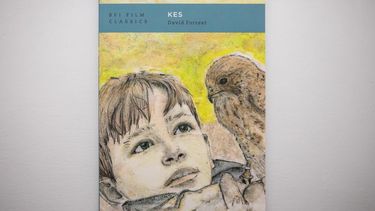- A new book published by the British Film Institute is celebrating the lasting legacy of Ken Loach’s 1969 drama Kes and its impact on both British and world cinema
- Written by an expert in film from the University of Sheffield, the book shines a spotlight on how Kes is a key resource for understanding post-industrial Britain and the current politics in the North of England
- University of Sheffield professor is also highlighting how working class arts, film and literature are more important than ever and how stories like Kes give young, working class people a voice
Ken Loach's 1969 drama Kes has been recognised as a British classic and a landmark in world cinema, by a new book published by the British Film Institute (BFI).
Considered one of the finest examples of British social realism, Kes tells the story of Billy, a working class boy who finds escape and meaning when he takes a fledgling kestrel from its nest. Based on Barry Hines' novel, A Kestrel for a Knave, the film went on to win two BAFTA awards and was nominated for a further three.
Now, 55 years on from its original release, a new book written by Professor Dave Forrest from the University of Sheffield’s School of English - an expert in British film and the life and works of Barry Hines - is celebrating Kes for its lasting legacy and its enduring cultural presence.
The book also highlights how Kes is a key resource for understanding the cultural heritage of post-industrial Britain and the politics of the North of England today.
Published as part of the BFI’s Film Classics series, the book recognises the impact of Kes on both British and world cinema.
Professor Dave Forrest, Professor of Film and Television Studies at the University of Sheffield, said: “Kes endures because it tells a universal story about education, potential, and resistance, with a powerfully authentic sense of specificity - this is a specificity that comes from its location in Barnsley, and from the non-professional actors - many of them children - who drew on their own lives and experiences to give the film its realism. The film shows us that places like Barnsley - often overlooked and maligned in mainstream culture - are sites of humour, creativity, beauty and potential. Far from being pessimistic, Kes points to a hopeful way of imagining Britain as formed from the unique cultural contributions of its regions, towns and cities.”
As part of his research when writing the book, Professor Forrest studied the Hines archive - a collection of papers from Barry Hines that were donated to the University of Sheffield’s Library. The collection includes manuscripts of his major works, including A Kestrel for a Knave, the basis for the film.
Papers in the collection show how Hines and the film’s director Ken Loach, together with the film’s writer Tony Garnett, collaborated to bring the story to the screen, as well as an insight into how it was funded and produced.
On publishing the book, Professor Forrest is also highlighting the renewed importance of working class film and literature in the UK, and how stories such as Kes are as important as ever.
Professor Forrest added: “The book explains the conditions that allowed the creativity at the heart of Kes to thrive, and traces how working-class artists such as Barry Hines, and the film’s producer, Tony Garnett, were able to draw on their own backgrounds to challenge the dominant ways of representing British society through film and television. I hope it might encourage us to reflect on what we are doing as a society to encourage creativity amongst all our communities, and how we might ensure that barriers to accessing and participating in the arts and creative industries are removed, so that our media culture reflects the rich diversity of our country.”
The book, Kes, is written by Professor Dave Forrest from the University of Sheffield’s School of English and published by the British Film Institute as part of its Film Classics series. Buy the book.
To mark the launch, a special screening of the film and an introduction to the book is being held at Sheffield’s Showroom Cinema on Thursday 9 May at 6pm. More information and tickets.



